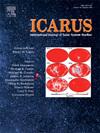Biogeochemical study of the periglacial slopes of the Nevado del Ruíz volcano (Colombia) as a terrestrial analog of Mars
IF 3
2区 物理与天体物理
Q2 ASTRONOMY & ASTROPHYSICS
引用次数: 0
Abstract
The Refugio sector of the Nevado del Ruiz Volcano, located in Colombia, has been the focus of multidisciplinary exploration aimed at understanding its geology, geochemistry, mineralogy, and microbiology, with the objective of evaluating its relevance as a potential terrestrial analog of astrobiological interest for Mars. Through detailed physicochemical analyses of soil samples, variability in properties such as pH, electrical conductivity, and nutrient content has been characterized, revealing the diversity of microenvironments within this volcanic region. Comparison with analog samples from Mars, taken from the ISAR collection, has highlighted significant differences in geochemical composition, particularly in MnO, Fe₂O₃, and SiO₂ content, underscoring the importance of Nevado del Ruiz as a key site for studying Martian geological processes. Furthermore, CRISM spectroscopy analyses have confirmed the presence of minerals similar to those found in Mawrth Vallis on Mars, further supporting the site's validity as a terrestrial analog for planetary studies. Finally, the isolation of bacterial species identified as Klebsiella spallanzanii and Bacillus cereus, two oligotrophic and psychrophilic microorganisms, capable of phosphate solubilization and nitrogen fixation, found at Nevado del Ruiz support the development of biological models of astrobiological relevance. Together with the other findings, this evidence reinforces the importance of Nevado del Ruiz as a natural laboratory for astrobiology and space exploration, with the potential to provide information for future planetary exploration missions.
内华达德尔Ruíz火山(哥伦比亚)冰周斜坡的生物地球化学研究,作为火星的地球模拟物
位于哥伦比亚的内华达德尔鲁伊斯火山的Refugio区一直是多学科探索的重点,旨在了解其地质、地球化学、矿物学和微生物学,目的是评估其作为火星天体生物学兴趣的潜在陆地模拟物的相关性。通过对土壤样品进行详细的物理化学分析,表征了pH值、电导率和养分含量等特性的变化,揭示了该火山区域微环境的多样性。与来自火星的ISAR收集的模拟样本进行比较,突出了地球化学成分的显著差异,特别是在MnO、Fe₂O₃和SiO₂含量方面,强调了内华达德尔鲁伊斯作为研究火星地质过程的关键地点的重要性。此外,CRISM光谱分析证实了与火星Mawrth Vallis中发现的矿物相似的矿物的存在,进一步支持了该地点作为行星研究的陆地模拟物的有效性。最后,在内华达州德尔鲁伊斯发现的两种寡营养和嗜冷微生物——斯帕兰氏克雷伯菌和蜡样芽孢杆菌的分离,支持了与天体生物学相关的生物模型的发展。与其他发现一起,这一证据加强了内华达德尔鲁伊斯作为天体生物学和太空探索的天然实验室的重要性,有可能为未来的行星探索任务提供信息。
本文章由计算机程序翻译,如有差异,请以英文原文为准。
求助全文
约1分钟内获得全文
求助全文
来源期刊

Icarus
地学天文-天文与天体物理
CiteScore
6.30
自引率
18.80%
发文量
356
审稿时长
2-4 weeks
期刊介绍:
Icarus is devoted to the publication of original contributions in the field of Solar System studies. Manuscripts reporting the results of new research - observational, experimental, or theoretical - concerning the astronomy, geology, meteorology, physics, chemistry, biology, and other scientific aspects of our Solar System or extrasolar systems are welcome. The journal generally does not publish papers devoted exclusively to the Sun, the Earth, celestial mechanics, meteoritics, or astrophysics. Icarus does not publish papers that provide "improved" versions of Bode''s law, or other numerical relations, without a sound physical basis. Icarus does not publish meeting announcements or general notices. Reviews, historical papers, and manuscripts describing spacecraft instrumentation may be considered, but only with prior approval of the editor. An entire issue of the journal is occasionally devoted to a single subject, usually arising from a conference on the same topic. The language of publication is English. American or British usage is accepted, but not a mixture of these.
 求助内容:
求助内容: 应助结果提醒方式:
应助结果提醒方式:


